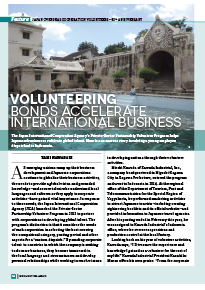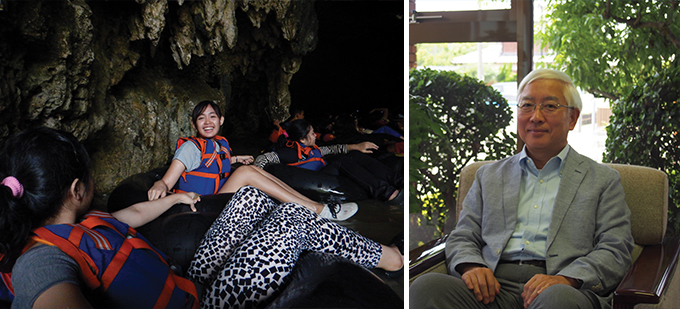Home > Highlighting JAPAN >Highlighting Japan August 2015>Japan Overseas Cooperation Volunteers—50th Anniversary
Highlighting JAPAN

Japan Overseas Cooperation Volunteers—50th Anniversary
Volunteering Bonds Meet Mutual Needs
The Japan International Cooperation Agency’s Private-Sector Partnership Volunteer Program helps Japanese businesses cultivate global talent. Here is one success story involving a young employee dispatched to Indonesia.

As emerging nations ramp up their business development and Japanese corporations continue to globalize their business activities, the needs to provide a global vision and grounded knowledge—and secure talent who understand local languages and cultures as they apply to corporate activities—have gained vital importance. In response to these needs, the Japan International Cooperation Agency (JICA) launched the Private-Sector Partnership Volunteer Program in 2012 to partner with corporations in developing global talent. The program’s distinction is that it considers the needs of each corporation in selecting the host country, the occupational category, posting period and other aspects for a “custom dispatch.” By sending corporate talent to countries in which the company is seeking to do more business, they become immersed in the local language and circumstances and develop personal relationships while working to resolve issues in developing nations through their volunteer activities.
Hiroki Kawada of Kawada Industrial, Inc., a company headquartered in Higashi-Kagawa City in Kagawa Prefecture, entered the program and went to Indonesia in 2014. At the regional office of the Department of Tourism, Post and Telecommunication for the Special Region of Yogyakarta, he performed marketing activities to attract Japanese tourists—including creating sightseeing booklets and its official website—and provided information to Japanese travel agencies. After his posting ended in February this year, he was assigned to Kawada Industrial’s Indonesia office, where he oversees operations and production control at the local factory.
Looking back on his year of volunteer activities, Kawada says, “I’ll treasure the experience and knowledge I gained as a volunteer for the rest of my life.” Kawada Industrial President Kazuhiko Murao offers his own praise: “From the corporate perspective as well, this experience turned out to be ideal.”
Kawada Industrial, which produces sports gloves and has nine decades of history, boasts a 30 percent share of the Japanese domestic market for golf gloves. While headquartered in Higashi-Kagawa City, the largest production center of gloves in Japan, the company does all its manufacturing in overseas factories such as in China. During the process of opening their factory in Yogyakarta in 2014, however, concerns arose about the differences in business practices between the two cultures, such as the speed of business and decision-making procedures. President Murao was surprised to find that “while employees we had trained ourselves struggled to make progress with procedures such as approvals and authorizations at local government offices, they were instantly furnished when young Mr. Kawada handled them.” According to Murao, the highly proficient language skills and understanding of the local culture Kawada acquired, as well as his knowledge of the area and interpersonal relationships, are the major driving forces behind the latter’s success.
During his days at the Office of Tourism, Kawada would travel to tourism areas on foot and gather information by talking directly with the people in those locales. And while he struggled at times, he says “the language skills and encounters, the knowledge of the local culture and geography—the benefits I gained were truly invaluable.” While Indonesia’s easygoing society can at times present a hurdle to commercial practices, at the same time he steadily gained experience and cultivated methods for advancing business.
“For small to medium-sized companies, JICA supplements a portion of the labor costs during the volunteer program, and even provides living accommodations,” Murao points out. “Because we can develop outstanding talent while keeping the cost of dispatching an employee to the area low, the merits from the corporate perspective are extremely favorable.
“Seeing Mr. Kawada’s growth firsthand, I’m certain he will contribute immensely to our Indonesia business,” Murao continues. “The intuition and global business sense that can be gained from being at an overseas base of production will be of great help to the industry in creating products.”
Kawada is also enthusiastic. “I’d like to take advantage of my knowledge and experience, and by producing good results in Indonesia repay the kindness my company has shown me with this wonderful opportunity.”
© 2009 Cabinet Office, Government of Japan






